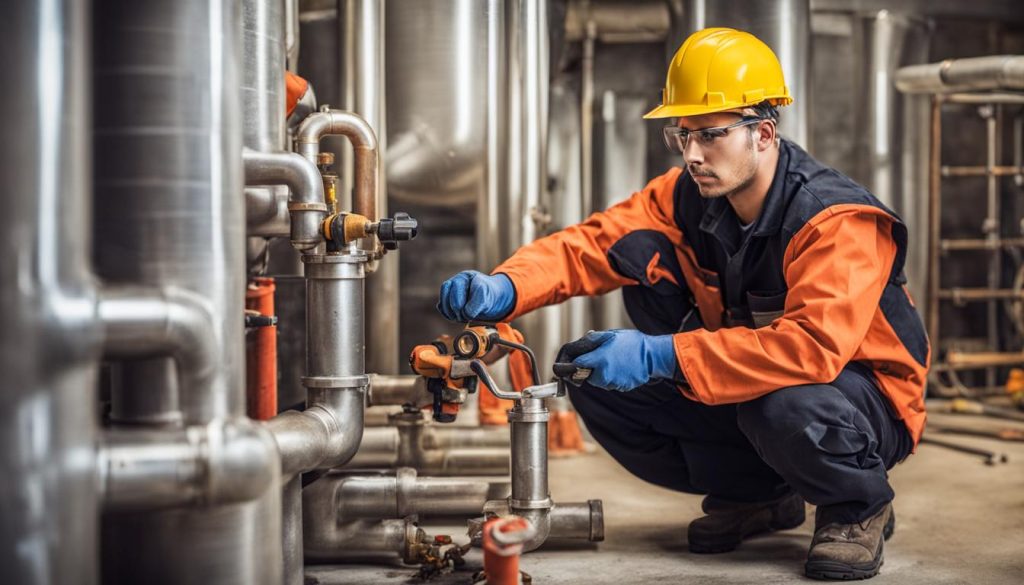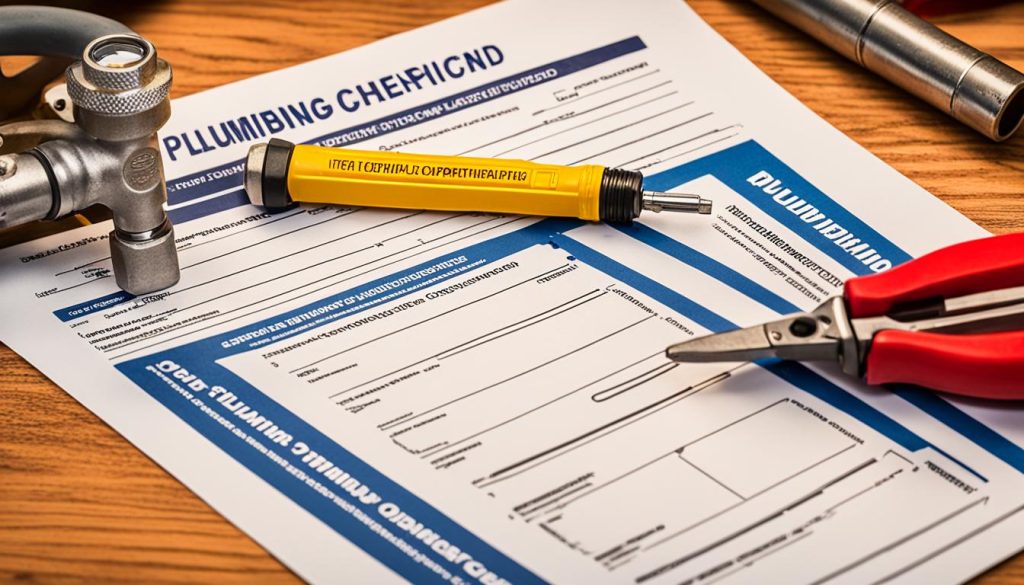Plumbing Apprenticeship License: Get Certified
Did you know that in Canada, the demand for licensed plumbers is steadily rising? With the construction industry booming and the need for plumbing expertise growing, obtaining a plumbing apprenticeship license has never been more important. Whether you’re considering a career change or looking for a secure and rewarding profession, becoming a licensed plumber could be your pathway to success.
Key Takeaways:
- A plumbing apprenticeship license is essential to pursue a career as a plumber.
- Plumbers play a crucial role in residential, commercial, and industrial plumbing systems.
- Becoming a licensed plumber requires completing a plumbing apprenticeship program and meeting specific certification requirements.
- Once licensed, plumbers can enjoy job security, competitive salaries, and potential career advancement.
- Don’t miss out on the opportunity to unlock a rewarding career in the thriving plumbing trade.
How to Become a Licensed Plumber
Are you interested in pursuing a career as a licensed plumber? Becoming a licensed plumber requires following a specific process that involves training, education, and certification. In this section, I will guide you through the steps to get a plumber’s license and provide insights into the plumbing apprenticeship training and license application process.
Step 1: Enroll in a Plumbing Apprenticeship Program
The first step towards becoming a licensed plumber is to enroll in a plumbing apprenticeship program. These programs typically last four years, divided into four 12-month periods. During the apprenticeship, you will receive on-the-job training by working under the guidance of experienced plumbers. Additionally, you will attend classroom instruction to gain theoretical knowledge and enhance your skills in the plumbing trade.
Throughout the apprenticeship, you will accumulate a minimum of 1,560 hours of on-the-job training each year and complete 8 weeks of classroom instruction. This comprehensive training will equip you with the necessary practical and theoretical knowledge to excel as a plumber.
Step 2: Pass the Interprovincial Exam
After completing the plumbing apprenticeship program, the next step is to pass the interprovincial exam, also known as the Red Seal Exam. This exam assesses your knowledge and skills in the plumbing trade and serves as a requirement to obtain your plumber’s license.
The Red Seal Exam is a comprehensive test that evaluates your understanding of plumbing principles, codes, regulations, and practical applications. By successfully passing this exam, you demonstrate your competence and readiness to practice as a licensed plumber.
Step 3: Apply for Your Plumber’s License
Once you have completed your apprenticeship program and passed the interprovincial exam, you can proceed to apply for your plumber’s license. The specific process may vary depending on the province or territory in which you wish to practice. Generally, you will need to submit an application form, provide proof of completing the apprenticeship program, and pay the required fees.
Some jurisdictions may have additional requirements, such as proof of work experience or completion of other relevant certification exams. It is essential to familiarize yourself with the licensing requirements and procedures in your region to ensure a smooth and successful application process.
Plumbing Certification Requirements
To become a licensed plumber, individuals must meet specific certification requirements. In addition to completing a plumbing apprenticeship program, aspiring plumbers must demonstrate progress in their apprenticeship within the first 18 months. This can be achieved by engaging in an activity that contributes to the completion of a program period. After completing the apprenticeship, individuals are eligible to attempt the interprovincial exam during their final period of training. This exam assesses their knowledge and skills in the plumbing trade and, if successfully passed, grants them a Red Seal Certification. Attaining a Red Seal Certification signifies that a plumber’s skills meet the national standards for the trade.
Plumbing Apprenticeship Program
The plumbing apprenticeship program provides aspiring plumbers with the necessary training and education to become licensed professionals. The program typically lasts four years, with each year consisting of a minimum of 1560 hours of on-the-job training and 8 weeks of classroom instruction.
During the apprenticeship, individuals learn various aspects of the plumbing trade, including pipe installation, pipe sizing, equipment selection, and system testing. They gain hands-on experience working in the field and acquire theoretical knowledge through classroom instruction. This comprehensive training prepares apprentices to handle a wide range of plumbing tasks and equips them with the skills required to pass the certification exam.
By combining on-the-job training and classroom instruction, the plumbing apprenticeship program ensures that apprentices develop a well-rounded skillset. In the field, apprentices work alongside experienced plumbers, learning practical skills and techniques that are essential for success in the industry. They have the opportunity to apply their knowledge in real-world scenarios, troubleshooting and solving plumbing problems under the guidance of professionals.
In the classroom, apprentices delve into the theoretical aspects of plumbing, studying plumbing codes, blueprint reading, mathematics, and safety practices. They gain a deep understanding of the principles and concepts behind plumbing systems, enabling them to design, install, and maintain plumbing systems with precision and expertise.
The combination of on-the-job training and classroom instruction allows apprentices to develop both technical skills and critical thinking abilities. They learn how to analyze complex plumbing systems, identify potential issues, and implement effective solutions. This holistic approach to training ensures that apprentices are well-prepared to tackle the challenges of the plumbing trade and deliver high-quality workmanship.
Plumbing License Application Process
Applying for a plumber’s license is the final step in the journey to becoming a licensed plumber after completing the plumbing apprenticeship program and passing the interprovincial exam. The licensing process may vary depending on the province or territory where you plan to practice. Here is a general overview of what to expect when applying for a plumber’s license:
- Application Form: Start by filling out the required application form. The form will typically ask for personal information, details about your plumbing apprenticeship program, and any additional certifications or relevant work experience.
- Proof of Completion: Along with the application form, you will need to provide proof of completing the plumbing apprenticeship program. This can be in the form of a certificate or letter of completion from your training provider.
- Fees: There is usually an application fee associated with the license application process. Make sure to check the specific requirements of your province or territory and include the necessary payment with your application.
- Additional Documentation: Depending on the jurisdiction, there may be additional documentation required. This can include proof of work experience, completion of specific certification exams, or any other requirements specific to your region.
It is crucial to familiarize yourself with the licensing requirements and procedures in your area to ensure a smooth application process. By following the necessary steps and providing the required documentation, you can successfully apply for a plumber’s license and officially join the ranks of licensed plumbers in Canada.
Licensing Requirements by Province/Territory
| Province/Territory | Licensing Requirements |
|---|---|
| Alberta | Completion of apprenticeship program, passing the interprovincial exam |
| British Columbia | Completion of apprenticeship program, passing the interprovincial exam, additional certification exams |
| Manitoba | Completion of apprenticeship program, passing the interprovincial exam |
| New Brunswick | Completion of apprenticeship program, passing the interprovincial exam, additional work experience |
| Newfoundland and Labrador | Completion of apprenticeship program, passing the interprovincial exam |
| Nova Scotia | Completion of apprenticeship program, passing the interprovincial exam |
| Ontario | Completion of apprenticeship program, passing the interprovincial exam |
| Prince Edward Island | Completion of apprenticeship program, passing the interprovincial exam, additional work experience |
| Quebec | Completion of apprenticeship program, passing the interprovincial exam, additional certification exams |
| Saskatchewan | Completion of apprenticeship program, passing the interprovincial exam |
| Northwest Territories | Completion of apprenticeship program, passing the interprovincial exam |
| Nunavut | Completion of apprenticeship program, passing the interprovincial exam |
| Yukon | Completion of apprenticeship program, passing the interprovincial exam |
Each province or territory has its own unique requirements, so it is essential to research and understand the specific licensing process in your area. By completing the necessary steps and submitting the required documentation, you can successfully apply for a plumber’s license and embark on a fulfilling career in the plumbing industry.
Unlocking a Rewarding Career in Plumbing
Obtaining a plumbing apprenticeship license is the key to unlock a rewarding career in the skilled trades. As a licensed plumber, you’ll be in high demand, thanks to your expertise in the construction and maintenance of plumbing systems. This opens up numerous career opportunities in residential, commercial, and industrial settings, allowing you to choose the path that best suits your goals.
With a plumbing license, you have the flexibility to work as an independent contractor, providing your services to clients directly. Alternatively, you can join established plumbing companies, where you’ll have the opportunity to learn from experienced professionals and work on diverse projects. Whichever path you choose, being a licensed plumber means job security, competitive salaries, and the potential for career advancement.
The skilled trades industry offers a wide range of career opportunities, but skilled plumbers are always in demand due to the essential nature of their work. By embarking on a plumbing apprenticeship and obtaining a license, you are setting yourself up for a successful future in this dynamic and essential trade. So, seize the opportunity, unlock your potential, and embark on a fulfilling career in plumbing today.
- Investing Wisely: How Windows & Doors in Boost Property Value and Financial Health - April 24, 2025
- The Financial Impact of Personal Injuries: Why Legal Help Matters for Business Owners - April 16, 2025
- The Hidden Financial Costs of Domestic Assault: What Business Owners Need to Know - April 16, 2025













